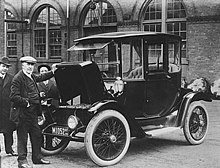Sure electric cars have been around since the beginning
They have.
http://en.wikipedia.org/wiki/Electric_car
Main article:
History of the electric vehicle
Electric cars enjoyed popularity between the mid-19th century and early 20th century, when electricity was among the preferred methods for automobile propulsion, providing a level of comfort and ease of operation that could not be achieved by the gasoline cars of the time. Advances in
internal combustion technology, especially the electric starter, soon rendered this advantage moot; the greater range of gasoline cars, quicker refueling times, and growing petroleum infrastructure, along with the mass production of gasoline vehicles by companies such as the
Ford Motor Company, which reduced prices of gasoline cars to less than half that of equivalent electric cars, led to a decline in the use of electric propulsion, effectively removing it from important markets such as the
United States by the 1930s. However, in recent years, increased concerns over the
environmental impact of gasoline cars, higher gasoline prices, improvements in battery technology, and the prospect of
peak oil, have brought about renewed interest in electric cars, which are perceived to be more environmentally friendly and cheaper to maintain and run, despite high initial costs. Electric cars currently enjoy relative popularity in countries around the world, though they were absent from the roads of the
United States, after they briefly re-appeared in the late 90s.

 Detroit Electric
Detroit Electric car charging
[h=3][
edit] 1890s to 1900s: Early history[/h]Before the pre-eminence of
internal combustion engines, electric automobiles held many speed and distance records. Among the most notable of these records was the breaking of the 100 km/h (62 mph) speed barrier, by
Camille Jenatzy on April 29, 1899 in his 'rocket-shaped' vehicle
Jamais Contente, which reached a top speed of 105.88 km/h (65.79 mph). Before the 1920s, electric automobiles were competing with petroleum-fueled cars for urban use of a quality service car.[SUP]
[20][/SUP]

 Thomas Edison
Thomas Edison and an electric car in 1913 (courtesy of the
National Museum of American History)

 Tribelhorn
Tribelhorn 1908
Proposed as early as 1896 in order to overcome the lack of recharging infrastructure, an exchangeable battery service was first put into practice by
Hartford Electric Light Company for electric trucks. The vehicle owner purchased the vehicle from General Electric Company (GVC) without a battery and the electricity was purchased from Hartford Electric through an exchangeable battery. The owner paid a variable per-mile charge and a monthly service fee to cover maintenance and storage of the truck. The service was provided between 1910 to 1924 and during that period covered more than 6 million miles. Beginning in 1917 a similar service was operated in
Chicago for owners of
Milburn Light Electric cars who also could buy the vehicle without the batteries.[SUP]
[21][/SUP]
In 1897, electric vehicles found their first commercial application in the U.S. as a fleet of electrical New York City taxis, built by the Electric Carriage and Wagon Company of Philadelphia. Electric cars were produced in the US by Anthony Electric,
Baker,
Columbia,
Anderson,
Edison [SUP]
[disambiguation needed  ]
][/SUP],
Fritchle,
Studebaker,
Riker,
Milburn, and others during the early 20th century.
Despite their relatively slow speed, electric vehicles had a number of advantages over their early-1900s competitors. They did not have the vibration, smell, and noise associated with gasoline cars. They did not require gear changes, which for gasoline cars was the most difficult part of driving. Electric cars found popularity among well-heeled customers who used them as
city cars, where their limited range was less of a disadvantage. The cars were also preferred because they did not require a manual effort to start, as did gasoline cars which featured a hand crank to start the engine. Electric cars were often marketed as suitable vehicles for women drivers due to this ease of operation.


The
Henney Kilowatt, a 1961 production electric car based on the
Renault Dauphine
In 1911, the
New York Times stated that the electric car has long been recognized as "ideal" because it was cleaner, quieter and much more economical than gasoline-powered cars.[SUP]
[22][/SUP] Reporting this in 2010, the
Washington Post commented that "the same unreliability of electric car batteries that flummoxed Thomas Edison persists today."[SUP]
[23][/SUP]







